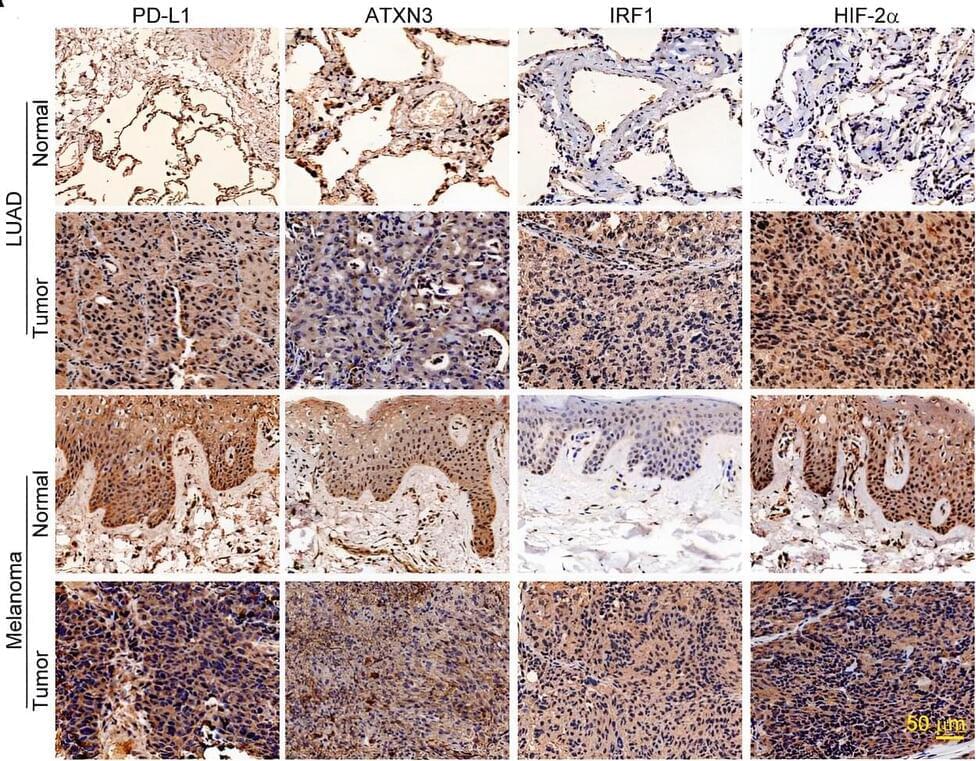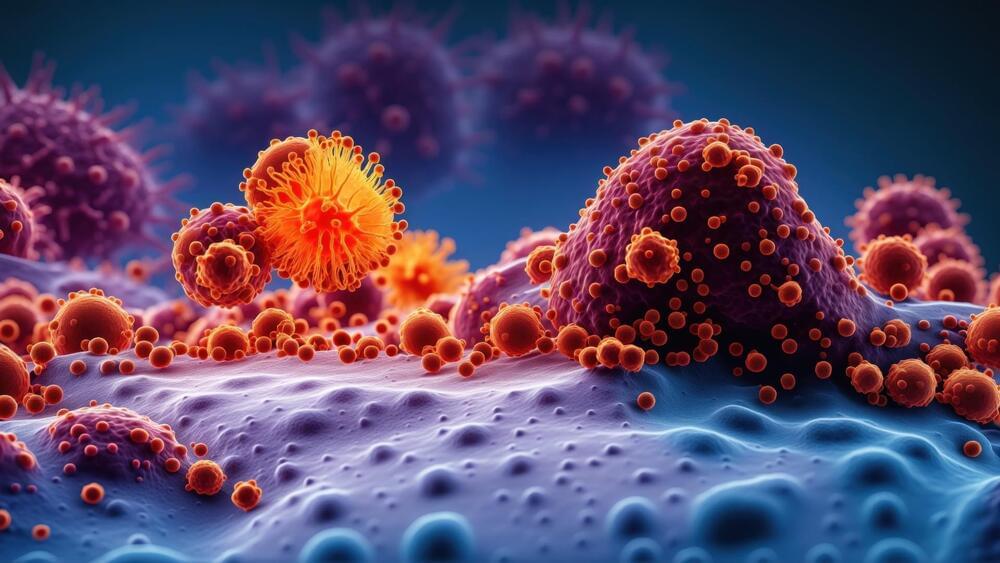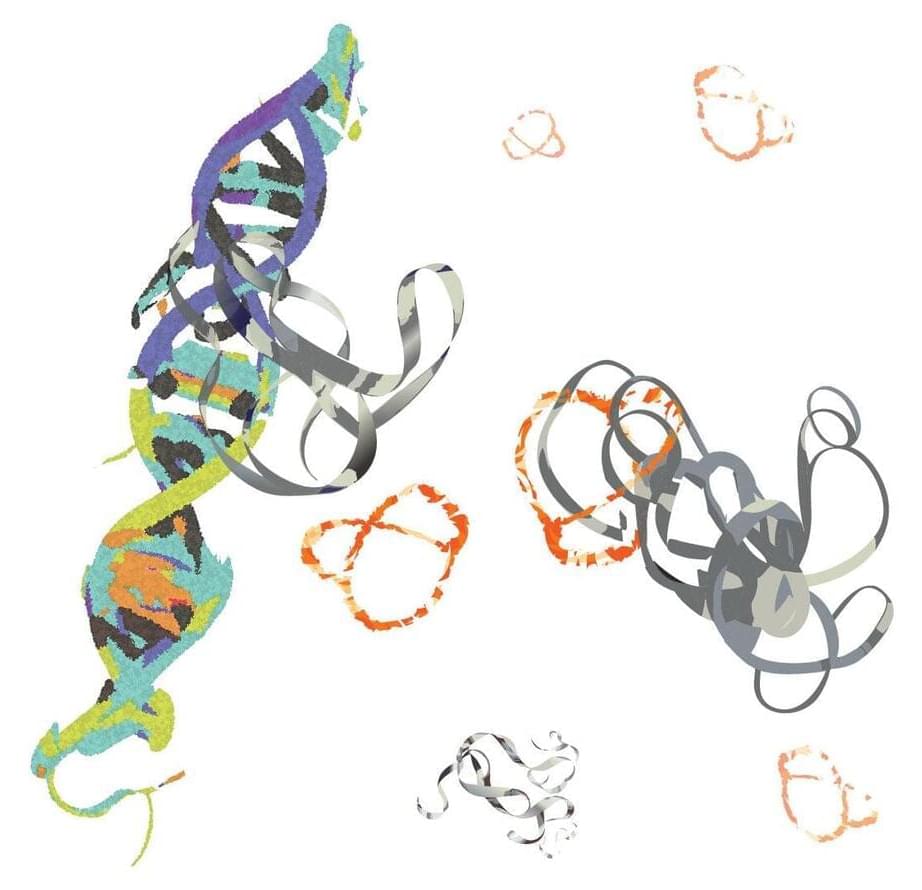Circulating tumor DNA predicts recurrence and splits disease into two subgroups in Stanford Medicine-led study of Hodgkin lymphoma. New drug targets or changes in treatments may reduce toxicity.
Category: biotech/medical – Page 790

Novel regulator of immune evasion in cancer identified
Northwestern Medicine investigators have identified a previously unknown regulator of tumor immune evasion, which may help improve the efficacy of current and future anti-tumor immunotherapies, according to recent findings published in the Journal of Clinical Investigation.
“The study provides a molecular insight into understanding why some cancer patients cannot be treated by the checkpoint blockade antitumor therapy, but others can,” said Deyu Fang, Ph.D., the Hosmer Allen Johnson Professor of Pathology and senior author of the study.
Antitumor immunotherapy is a type of cancer treatment that helps the immune system in fighting cancer and includes a range of therapy types, such as immune checkpoint inhibitors. Immune checkpoints help prevent the immune system from being too strong and eradicating other cells, including cancer cells.


Oral drug prevents death from COVID-19 in old mice by reversing immune aging
The immune system deteriorates with age, making COVID-19 particularly deadly in older people—but to date, no clinically available medication addresses this key risk factor. A study published today in Nature shows that an oral drug that reverses multiple aspects of immune aging effectively prevents death in a mouse model of COVID-19, suggesting that the medication could be used to protect the elderly patients who are at greatest risk in the pandemic.
In the study, daily doses of BGE-175 (asapiprant) protected aged mice from a lethal dose of SARS-CoV-2, the virus that causes COVID-19. Ninety percent of mice that received the drug survived, whereas all untreated control mice died. BGE-175 treatment was initiated two days after infection, when the mice were already ill, a time-frame relevant to real-life clinical situations in which patients would receive medication only after becoming symptomatic.
The mouse model used in the study closely mirrored the pathological progression of human COVID-19. The mouse-adapted strain of SARS-CoV-2 generated by the researchers caused a disease that shared many of the hallmarks of human COVID-19: accumulation of fluid in the air sacs of the lungs, extensive infiltration of lung tissue by immune cells, and high levels of pro-inflammatory factors called cytokines.

Cancer Vaccine Safe, Induces T-Cell Responses for KRAS-Mutated Tumors
FRIDAY, Jan. 12, 2024 (HealthDay News) — For patients with immunotherapy recalcitrant KRAS-mutated tumors, the cancer vaccine ELI-002 2P is safe and induces T-cell responses, according to a study published online Jan. 9 in Nature Medicine.
Noting that the cancer vaccine ELI-002 2P enhances lymph node delivery and immune response using Amphiphile (Amph)-modification of G12D and G12R mutant KRAS (mKRAS) peptides (Amph-Peptides-2P) together with CpG oligonucleotide adjuvant (Amph-CpG-7909), Shubham Pant, M.D., M.B.B.S., from the University of Texas MD Anderson Cancer Center in Houston, and colleagues treated 25 patients (20 with pancreatic cancer; five with colorectal cancer) positive for minimal residual mKRAS disease after locoregional treatment in a phase 1 study involving fixed-dose Amph-Peptides-2P and ascending dose Amph-CpG-7909.
The researchers found no dose-limiting toxicities; the recommended phase 2 dose was 10.0 mg Amph-CpG-7909. Overall, 21, 21, and six patients (84, 84, and 24 percent) had direct ex vivo mKRAS-specific T-cell responses, tumor biomarker responses, and biomarker clearance, respectively. Median relapse-free survival was 16.33 months. There was a correlation seen for efficacy with T-cell response; the median tumor biomarker reduction was −76.0 versus −10.2 percent. Median relapse-free survival was not reached compared with 4.01 months (hazard ratio, 0.14).
“Updates On COVID-19 and Cryonics Research” with Ben Best on James Bedford Day
Watch our Celebration of James Bedford Day special service. On this day we celebrate the remembrance of the biotechnology self-experimenter, Dr. James Bedford, who, on January 12, 2024, will have been cryonically preserved for 57 years.
Ben Best presents \.

Scientists Tame Chaotic Protein Fueling 75% of Cancers
Discovery opens window to more effective treatment. Meet MYC, the shapeless protein responsible for making the majority of human cancer cases worse. UC Riverside researchers have found a way to rein it in, offering hope for a new era of treatments.
In healthy cells, MYC helps guide the process of transcription, in which genetic information is converted from DNA into RNA and, eventually, into proteins.
“Normally, MYC’s activity is strictly controlled. In cancer cells, it becomes hyperactive, and is not regulated properly,” said UCR associate professor of chemistry Min Xue.
Organoid Intelligence Overtaking AI
Organoid intelligence is the growing of mini-brains from human stem cells, which has potential benefits for medical research and treatments.
However, there are significant ethical concerns related to the possibility of creating conscious entities and the potential for misuse. Organoid intelligence could offer valuable insights into neurological diseases, but we must establish a framework for their creation and treatment to ensure ethical use. As we continue to develop this technology, we must approach it with caution due to the potential dire consequences of its misuse.
#organoidintelligence #artificialintelligence #ethics

OncoRay launches world’s first whole-body MRI-guided proton therapy system
This week saw the official inauguration of the world’s first research prototype for whole-body MRI-guided proton therapy. The launch ceremony, at OncoRay – the National Center for Radiation Research in Oncology in Dresden, marked the start of scientific operation using the prototype, which is designed to enable real-time MRI tracking of moving tumours during proton therapy.
Proton therapy provides a means to treat tumours with extreme precision. The finite range of a proton beam enables extremely conformal dose targeting with reduced dose to nearby healthy tissue. This high conformality, however, makes proton treatments particularly sensitive to anatomical changes in the beam path, which can impair the targeting precision when treating a moving target. Real-time imaging during treatment could help solve this drawback by synchronizing dose delivery with the tumour position.
\r \r

Balada Injector Infects Over 7,100 WordPress Sites Using Plugin Vulnerability
⚠️ Over 7,100 WordPress sites have been hit by the ‘Balada Injector’ malware, which exploits sites using a vulnerable version of the Popup Builder plugin. Read More ➡️ https://thehackernews.com/2024/01/balada-injector-infects-over-7100.htm
Thousands of WordPress sites using a vulnerable version of the Popup Builder plugin have been compromised with a malware called Balada Injector.
First documented by Doctor Web in January 2023, the campaign takes place in a series of periodic attack waves, weaponizing security flaws WordPress plugins to inject backdoor designed to redirect visitors of infected sites to bogus tech support pages, fraudulent lottery wins, and push notification scams.
Subsequent findings unearthed by Sucuri have revealed the massive scale of the operation, which is said to have been active since 2017 and infiltrated no less than 1 million sites since then.